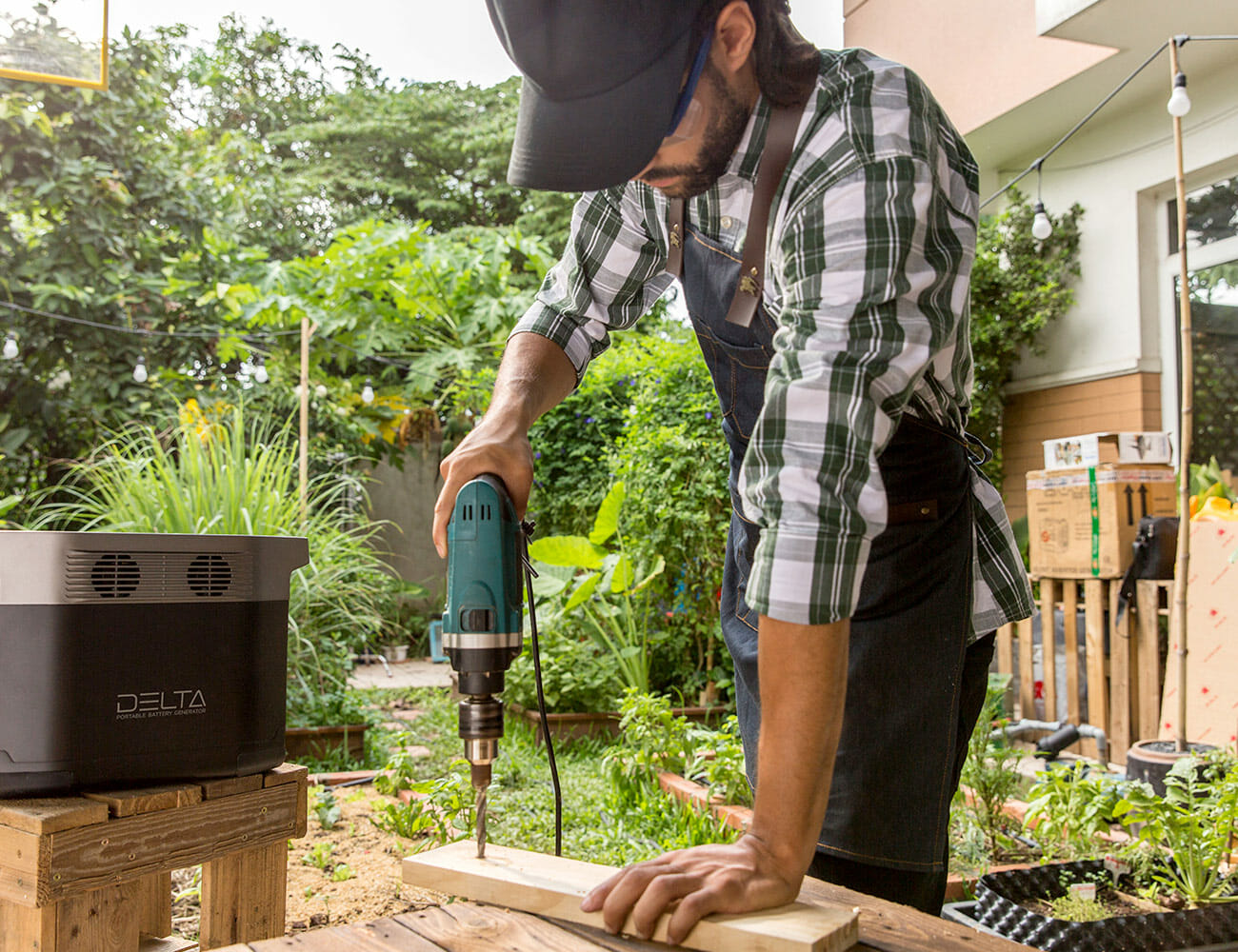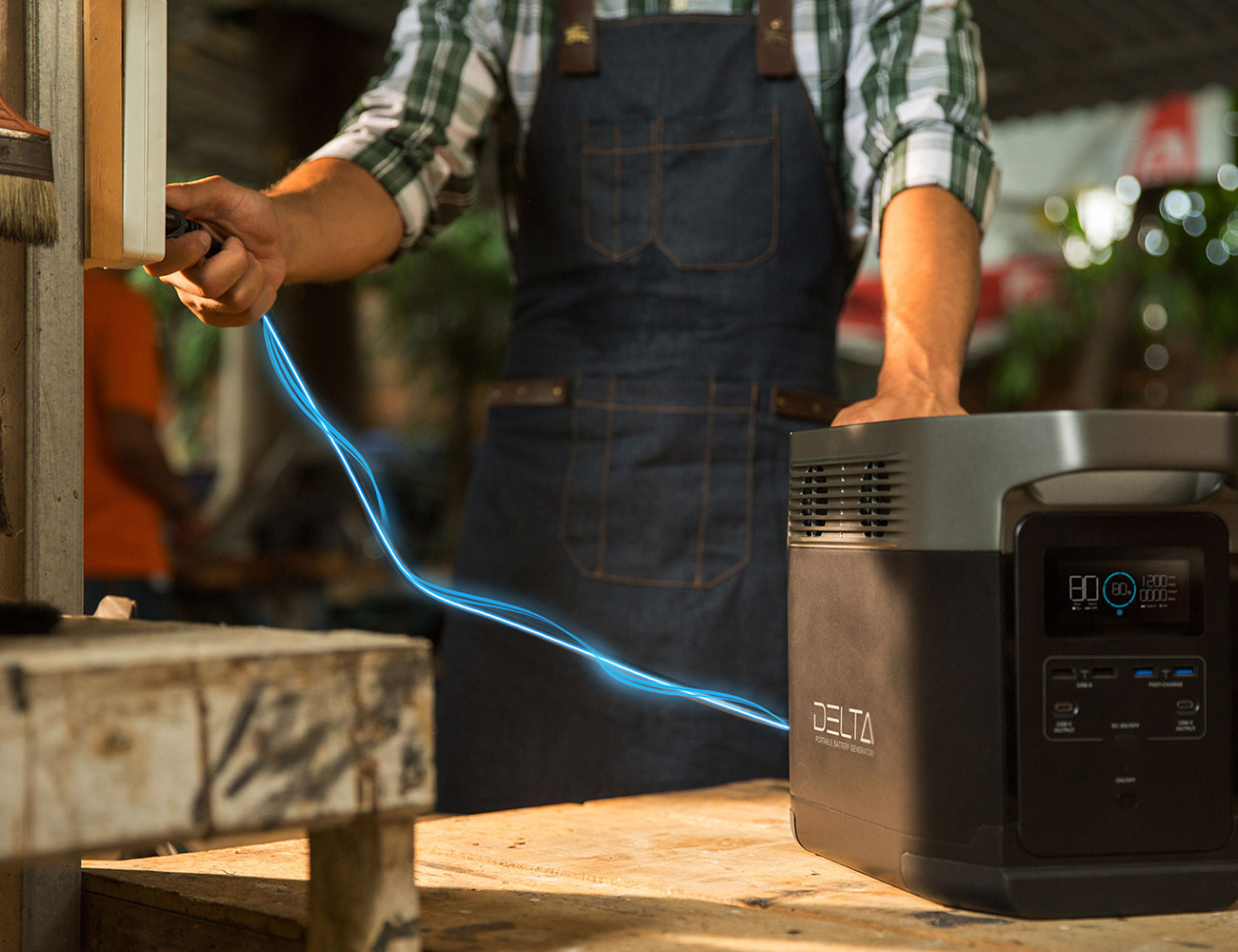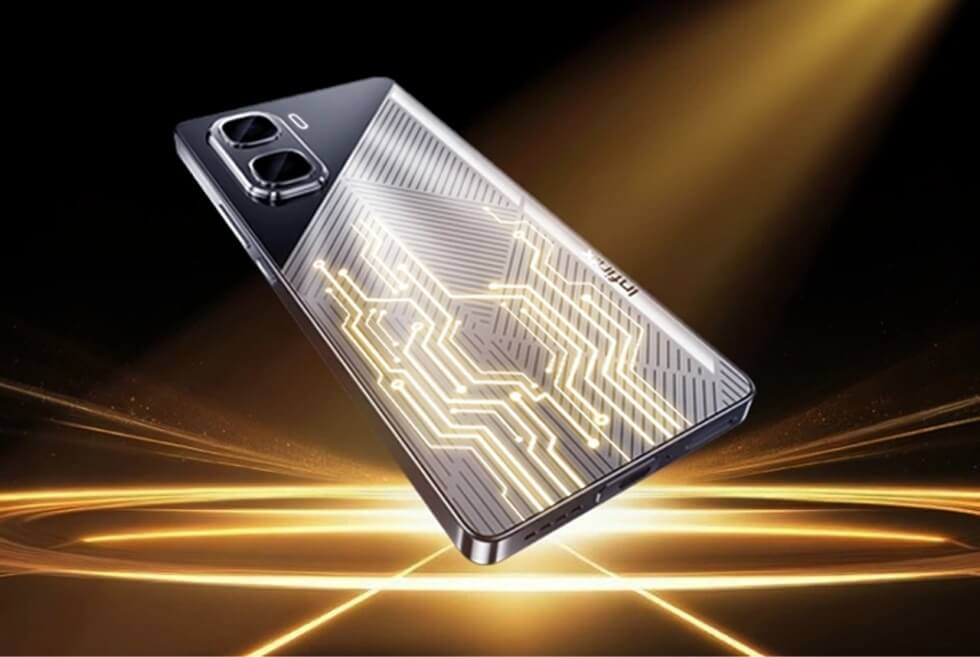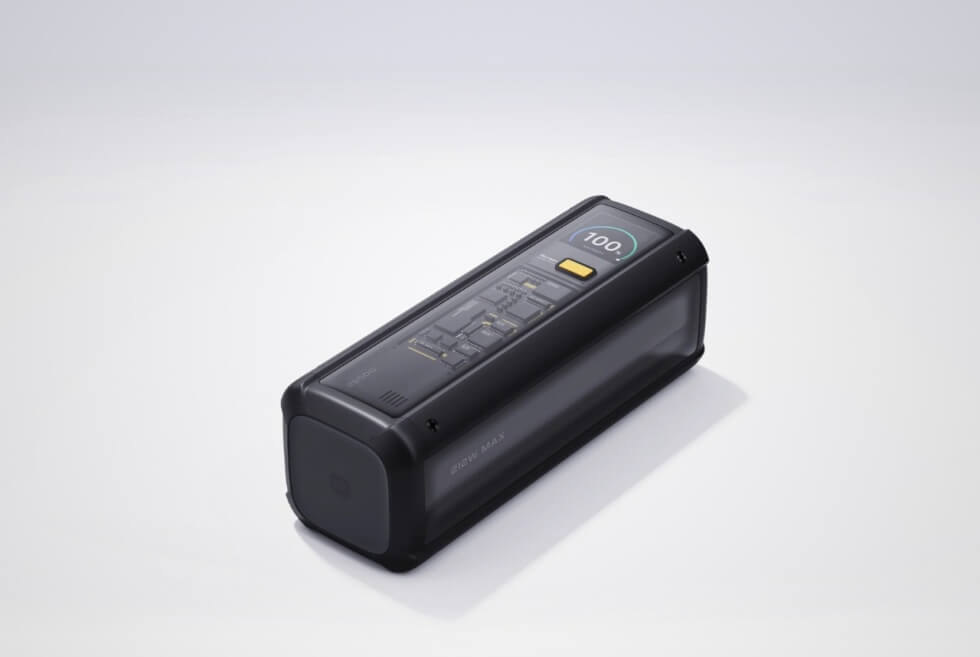Portable power is a quickly evolving category, and Ecoflow’s Delta 1300 demonstrates just how far it’s come. Lithium-ion batteries are not just for your phone; this compact and powerful battery bank is a lightweight gas-free, emissions-free generator that’s powerful enough to run woodshop tools, office electronics, a portable refrigerator or medical device, and light enough to carry between locations. As an emergency back-up generator, it will keep you charged and comfortable in a power outage, but it has so much functionality it won’t gather dust while you’re waiting for the next blackout. In addition to charging phone, drone, and laptop, and to running circular saws, air compressors, and lights, Delta can charge an electric car enough to eke out another five to seven miles until you can get to a proper charger.
The Good: The Delta 1300 has 6 AC outlets, 2 USB-C PD ports, 4 USB outlets, and it’s rechargeable from a wall socket, carport, or solar panel. This unit plugs into the wall with the same cord you’d use to plug in a computer. There’s no specialized, device-specific power brick required, so you don’t have to worry about misplacing your charger. The Delta can juice 13 devices simultaneously, which means you’ll be popular at festivals and trade shows with one of these in your tent, van or booth. A large LCD screen tells you how much battery the lithium-ion bank has left, both by percentage and hours. The readout is based on the Delta’s activity at any specific time. For example, it’ll likely read 99 hours when you plug in your dead cell phone. If it’s charging a large Dometic fridge/freezer, the readout will more likely be 20-32 hours. It’s super portable at around 30 lbs and the size of a toaster oven with oversized handles that are easy to grab
Who It’s For: If you’ve ever considered a gas-powered generator as an emergency backup, you’re a candidate for Delta. If you want to run power tools away from a wall plug or without the hassle of ultra-long extension cords you need one of these. If you live off-grid, whether you’re stationary or mobile, Delta can power your lights, tools, electronics and appliances. In an emergency not only will it power a fan or heater, lights, and microwave, it can power a medical device like a CPAP. It can also give people who require electrical medical devices some freedom to roam.

Watch Out For: It’ll take you some time actually using the Delta before you’ll be able to get a good handle on how long it will actually last in various scenarios. Most electrical devices pull power at a variable rate, so the number of remaining hours of power displayed on Delta’s screen may change without notice if your gadgets suddenly get a bit hungrier. I plugged a Dometic fridge/freezer into the Delta, and the screen told me I had 38 hours of run time. Four hours later, the screen told me I had 20 hours of run time. The change makes sense. When the fridge needed cooling, its energy consumption was greater. The Delta records its own power output continuously and as it does, the unit adjusts its battery life readout. When the fridge reached temperature, then the remaining battery time on Delta’s screen went back up. That said, the battery life estimates shared by EcoFlow seem to be extremely accurate and not inflated.
Alternatives: There are other battery-powered generators out there, as well as gas-powered generators. Most gas generators are more expensive, as are other powerful battery generators. Gas generators are loud, smelly and you can’t run them safely inside because of their carbon monoxide emissions. They need annual maintenance. Delta requires no annual maintenance. The battery maintains its charge for a year untouched, and the only noise is a quiet hum. The only emission from Delta is a little bit of heat.
There are other battery power banks on the market, like the Goal Zero Yeti 1400. That unit takes 12 times longer to charge plugged into a wall, it weighs 50 percent more, and it’s slower to charge with a solar panel. EcofFow’s claimed power capabilities for the Delta 1300 are considerably greater than those claimed by Goal Zero for the Yeti 1400. The Yeti 1400 is twice the price and claims a lifecycle of 500 charges, versus EcoFlow Delta’s claimed life of 800 charges.
Review:
To use Delta, you press the power button and then press a second on/off switch for AC or DC power. The LCD screen, in addition to telling you hours and battery percentage remaining, indicates high and low temperature, whether the fan is working, input, output with an overload warning.
We ran every tool we had and charged every device: circular saws, table saws, shop vacs, computers, phones, fridges and more. We were only able to fully drain the battery during the course of normal use when we plugged in a full freezer trying to cool its contents from 14°F to 0°F. The battery lasted at least 20 hours; we woke up to it needing a recharge.
Delta goes from zero percent charge to 80 percent charge in an hour, and can fully charge with just two hours plugged into the wall. EcoFlow says Delta charges in four hours via a solar panel. In order achieve such short charge times, EcoFlow also developed a charging technology, bi-directional X-stream Charge, that allows alternating current AC from a wall outlet to be directly inputted into Delta’s inverter, increasing its charging power at the same time. “By passing through the inverter directly, we can increase charging speed to more than ten times of the traditional AC to DC adapter cable,” said EcoFlow found Eli Harris. The proprietary charging technology also integrates all direct current power supplies below DC 60V, from an adapter, solar or car DC output, into one input port. The result is that users don’t need to consider whether they recharge Delta with a wall plug or solar panel. The system automatically recognizes the power source.
In addition to a new charing technology, the company built an entire proprietary internal integrated architecture from the ground up to maximize Delta’s power storage efficiency. EcoFlow designed and developed every component inside Delta, which includes more than 100 battery cells. Harris said one of the company’s biggest challenge was effectively monitoring and managing the operation of the whole system in real-time. EcoFlow’s battery management system was key. Harris and his team built it so the main controller collects the temperature and power status of each battery cell in real-time and then adjusts the charging current and the voltage to ensure the safest, fastest charging rate. When the unit is in idle, the battery management system monitors and adjusts the unit’s power status to ensure lower power consumption and extended standby power storage, which is how the company achieved a shelf-life of a year plus.

Delta is designed to take a beating. The unit we tested was pre-production, so did not have the correct casing. But we know from testing EcoFlow’s River battery bank that they know how to make their power banks durable without a heavy, bulky full-steel casing. Harris says that Delta’s housing was inspired by Tesla, and that final production will use a combination of aerospace-grade aluminum and high-strength steel to give Delta maximum strength and structural rigidity. It will be combined with impact-absorbing plastic, protective rigid metal plates, and four aluminum pillar reinforcements so that Delta is worthy of withstanding the hazards of a job site, garage project or bouncing around in the back of an off-road vehicle.
Verdict: Harris says he created EcoFlow to build this generator, and while we expect the company to blow this battery’s capacity out of the water with future versions, this one is undoubtedly worth owning for anyone who needs a reliable source of power or backup power. The Delta raised over $1M in the first 48 hours on Kickstarter, and it’s currently nearing $1.5M. Delta 1300 is an awesome solution for home or home office, van life and for powering tools away from a wired source of electricity. None of the claims made on EcoFlow’s Delta Kickstarter page are exaggerated. We were impressed with Delta’s power, versatility, quick charge time and compact size. Support Delta before the campaign closes on October 19—and as thanks for your trust in the company’s technology, you get peace of mind via a lifetime battery warranty.
Key Specs
Weight: 30 lbs
Ports: 6 AC outlets, 2 USB-C PD, 4 USB
Shelf Life: 12 months
AC Output: 1600w (surge 3100w)
Charge Time: 1.7 hours
Type: Lithium-Ion
Price: $699
EcoFlow provided this product for review.

Hot takes and in-depth reviews on noteworthy, relevant and interesting products. Read the Story




